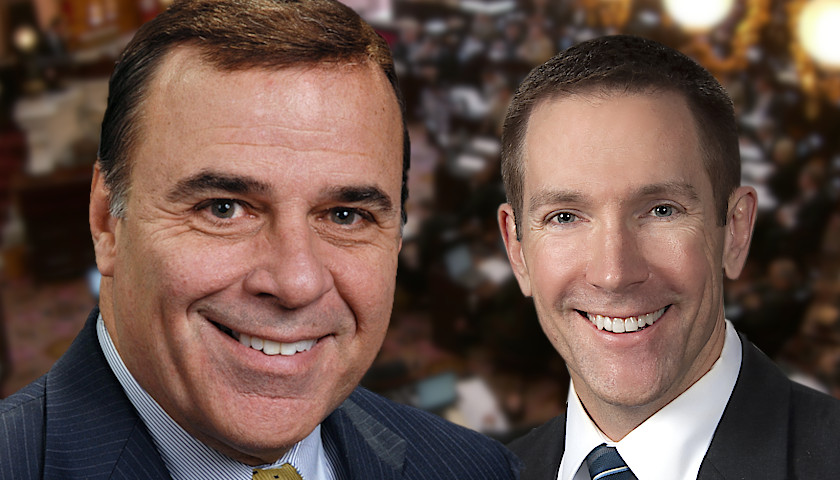This week, Ohio Secretary of State Jon Husted has triggered one of the most consequential and controversial “voter integrity” measures in the country. 275,000 inactive voters, registered in Ohio, have been sent “last chance” letters, informing them that if they do not confirm their current address and voting status, they will be purged from the voter rolls. Voters are considered inactive if they have not participated in two consecutive elections. They are then sent a series of letters, requesting that they up update their addresses. Should they fail to respond, they are then ruled inactive. In effect, an individual would have to not vote and ignore every letter sent over the course of almost half a decade to be ruled inactive. Eighteen other states use a similar practice. However, the process was challenged in the United States Supreme Court by the A. Philip Randolph Institute (Husted v. Randolph Institute). They alleged that the real purpose of these measures is to deny voting rights to racial minorities and the poor who are disproportionately affected by the measure. In a 5-4 decision on June 11, 2018, the court upheld the practice. In spite of this, progressives still alleged the mechanism is a violation of civil rights…
Read the full storyAuthor: Andrew Shirley
In Final Days as Attorney General, DeWine Files Motion to Dismiss Ohio Redistricting Lawsuit
Gov.-elect Mike DeWine (R-OH) appears to be making every last day of his tenure as Attorney General count. This week, DeWine filed a motion to have an upcoming gerrymandering lawsuit tossed out. The suit would mandate the redrawing of all of Ohio’s 16 congressional districts before the 2020 election. In May of 2018, a group of plaintiffs, including one Democratic constituent from all 16 districts, filed a federal lawsuit alleging that the current congressional districts were: an unconstitutional partisan gerrymander that violates the First Amendment, the Fourteenth Amendment, and Article I of the United States Constitution….the most egregious gerrymanders in recent history. The primary force behind the legal challenge is the Ohio League of Women Voters. Should the suit be successful, the state would be required to redraw the congressional districts before the 2020 election with new procedures that would be a radical departure from the current standard. DeWine seeks to have the suit thrown out on the grounds that the plaintiffs cannot prove harm and that there is no legal standing for the case. In May, Ohioans overwhelmingly voted to reform the current system of redistricting. Traditionally, following each census, the party in power would control the redistricting process. Issue 1 will…
Read the full storyOhio State Board Considers Approving More Conditions for Marijuana Treatment
With medicinal marijuana sales imminent in the Buckeye state, the Ohio State Medical Board is currently considering a slew of additional medical conditions for medicinal marijuana treatment. Currently, 21 conditions are approved for the controversial treatment. A number of the conditions cover a wide swathe of ailments. For example, cancer is an approved condition but it does not specify which of the more than 100 known forms of cancer that occur in humans are covered and which aren’t, so, presumably, all of them could be. It would ultimately be at the mercy of the prescribing doctor, though any doctor found overprescribing could be fined, lose their medical license, and even face jail time. Per Ohio Administrative Code 4731-32-05, every year the state is required to give citizens the opportunity to submit petitions for new conditions to be approved for marijuana treatment. Thus far, the Ohio State Medical Board has received 110 petitions. Forty-four of these documents were asking treaments that are already included in the Code. Fifty-four did not meet the final requirements or number of signatures but may be resubmitted. Among the new conditions being considered are anxiety, depression, and insomnia. Per a recent medical study, there is very little research on the…
Read the full storyKasich Launches Broadside Against Trump After President’s Prime-Time Speech
Following President Donald Trump’s prime-time address to the nation Tuesday, Gov. John Kasich (R-OH) issued a blistering rebuttal of the president over his handling of the current government shutdown. Though he was also critical of Democrats and Republicans, he specifically stated the problem was the result of a lack of “leadership.” The President needs to put the country ahead of politics. pic.twitter.com/ZyXZilJdfs — John Kasich (@JohnKasich) January 9, 2019 Kasich began by noting: The President and the Democrats need to learn how to compromise and put the American people first. It starts with the President putting the country ahead of his politics and being more flexible with his goals. The majority of media outlets have interpreted these comments as a direct attack on Trump. Though Kasich does go on to reaffirm his commitment to having “a secure border,” he ends his statement by saying that “our country needs real leadership to solve our problems. Right now it doesn’t look like that leadership exists in Washington, DC.” The president’s Tuesday night address was a brief and direct appeal to the American people to support his effort to secure funding for a border wall. He outlined the many lives that have been affected by illegal…
Read the full storyAs US Economy Swells, Ohio Gets Left Behind
2018 was one of the best economic years for America in decades. The coup de grâce came in December with a jobs report that shattered the most generous expectations by more than double. 312,000 new jobs were added to the US economy. While unemployment rose slightly, this was primarily due to more people getting back into the job market after giving up hope of finding work. In total, more than 2.6 million jobs were added in 2018; the fastest job growth in decades. So how did Ohio fare? Not great. Ohio undoubtedly had some noteworthy achievements. 2018 was Ohio’s ninth consecutive year of record-breaking new business filings with 125,000 new businesses created. In July, Ohio’s jobs growth pace actually exceeded the national pace. Overall, Ohio added jobs and employment grew. Sadly, in some of the most key indicators, Ohio continued to lag behind the nation. In November, while the national unemployment rate rested at 3.7% (its lowest rate in 2018), Ohio’s unemployment rate was 4.6%. Ohio’s best month for unemployment (4.3%) didn’t even beat the nation’s worst month (4.1%). From January to November of 2018, Ohio’s total number of unemployed went from 271,269 to 263,197, a net employment of only 8,072 jobs. While some…
Read the full storyOhio Governor Kasich Signs Occupational Licensing Reform Bill, Increasing Market Competition
Governor John Kasich signed Senate Bill 255 (SB 255) Friday, reforming Ohio’s occupational licensing laws, some of which are considered to be the most economically crippling in the country. The law will require Ohio’s state legislature to examine every occupational licensing board in the state, assess their value and utility, then decide if they serve an essential function. If not, they will be disbanded. The legislatures have a five-year window to complete the examination. In addition, the Legislative Service Commission will review every future proposed board to ensure they are fair and not economically detrimental to citizens. The Buckeye Institute, a non-partisan, free-market think tank “whose mission is to advance free-market public policy in the states,” was the primary force advocating for and encouraging passage of the bill. Following it’s signing, Buckeye Institute Research Fellow, Greg R. Lawson celebrated the decision, stating: With the signing of Senate Bill 255, Ohio has gone from being one of the very worst states in the nation on occupational licensing to the very best…Through the extraordinary leadership of Senate President Larry Obhof, Senator Rob McColley, and Representative Ron Hood, Ohio can now rightly claim its place at the top of the list of states on occupational licensing,…
Read the full storyDrug Companies Seek Gag Order Against Republican Gov.-Elect Mike DeWine for Speaking Out on Opioid Crisis
Friday, lawyers representing some of the nation’s largest drug manufacturers began an attempt to sanction and silence Governor-elect Mike DeWine, stemming from his involvement in a lawsuit he initiated as Ohio Attorney General. The motion, filed by an amalgamation Big Pharma attorneys, accuse DeWine, along with lawyers Mike Moore and Burton LeBlanc of engaging in “a concerted campaign to taint potential jury polls in this district-and across the country-through misleading, inflammatory, and improper public statements.” According to the motion, the attempt came as a direct result of an explosive 60 Minutes episode that aired on December 16th featuring attorney Moore. The program detailed the massive lawsuit DeWitt and others are pursuing against the opioid industry. The 13-minute segment that aired on CBS focused primarily on Moore’s association with the case. The veteran lawyer was directly involved in two of the largest legal settlements in history. On May 1994, while serving as Attorney General of Mississippi, the Magnolia state became the first state to officially file suit against the tobacco industry. Forty-six other states eventually joined the suit. The Tobacco Master Settlement was agreed to in November 1998. Among many concessions, the tobacco industry would be required to pay over $200 billion dollars to the states…
Read the full storyOhio Proves Resilient as the Partial Government Shutdown Marks Its Second Week
With no end in sight to the partial-government shutdown, federal workers nationwide are adjusting to the possibility of an extended shutdown. While many areas of the country are heavily impacted, Ohio is poised to weather this storm. In a new report published Thursday, Ohio was revealed to be one of the states least affected by the government shutdown. Of all 50 states and the District of Columbia, The District was the most negatively affected with Minnesota as the least. Ohio came in at 42nd. The report was executed by WalletHub, a financial services company based in Washington DC. The rankings were the result of combining measurements for; Share of Federal Jobs Share of Federal Contract Dollars Per Capita Percentage of Families Recieving SNAP Real Estate as Percentage of Gross State Product Access to National Parks The report also found states which voted Democrat in 2016 were slightly more affected than states that voted Republican. According to the Labor Department numbers, as of June 2017, Ohio has 78,575 federal employees. While many of these Ohio residents have been affected by the government shutdown, almost half of these employees are military personnel, Department of Defense employees, of Veterans Affairs employees. This partial shutdown…
Read the full storyAs Ohio Senator Sherrod Brown Plans 2020 Run, High Dollar Backers Complicate His Future
Sen. Sherrod Brown (D-OH) has made it very clear that the Oval Office is in his sights. Coming off a six-point reelection victory, the only nonjudicial Democrat to win in Ohio in 2018, Brown has been working behind the scenes to build the infrastructure, support, and endorsements necessary to mount a challenge to President Donald Trump in 2020. However, the third-term Democrat’s presidential campaign may already be over before its even been announced. With as many as 30 Democrats reportedly considering 2020 presidential runs, some of the most visible progressive legislators have inadvertently sent stringent political litmus tests that will leave many contenders in a difficult position. Sen. Elizabeth Warren (D-MA), Sen. Bernie Sanders (I-VT), Rep. Alexandria Ocasio-Cortez (NY-14), and other assertively progressive candidates have made public overtures about the evil and corrupting nature of high dollar fundraising, special interest group funds, PAC’s, Super PAC’s, and other forms of corporate backing. Most of these candidates tout their reelection successes through only small individual donations as evidence of how unnecessary these election tools are. These candidates are now condemning any candidate, Democrat or Republican, who accepts funding from these entities. In 2016, a major talking point for Sanders’ presidential campaign was that his average campaign donation was $27,…
Read the full storyOpioid Abuse Estimated to Leave Over 20,000 Children in Foster Care by 2020
While the rampant opioid epidemic that has overtaken much of the country is finally getting the attention it deserves, some of the most vulnerable to its effects have been tragically overlooked. A startling report from the Public Children’s Services Association of Ohio estimates that, should current trends continue, over 20,000 children will be in foster care by 2020. From July 2017 to July 2018 alone, the total number of children entering foster care jumped from over 13,700 children to over 15,000. The main reason for this acceleration appears to be severe drug abuse throughout the state. In 2015, half of the children taken into foster care had come from families with some form of drug abuse. 28 percent were actively taking opioids when their children were removed. 67 percent of these children were under the age of 12 and over a quarter of them are three or younger. While the number of children in need continues to rise, support services are more strained than ever. The report also reveals that Ohio’s State Share for children services spending is currently dead last in the nation. Further, “even if the State’s Share…doubled, Ohio would still be 50th in the nation.” The majority of child…
Read the full storyWith Legal Marijuana Sales Imminent in Ohio, Demand Skyrockets
In as early as the coming days, the first legal marijuana dispensary will open for business in Ohio. Fifty-six sites have received approval for sale and several others are only waiting to receive the product before beginning distribution. However, many Ohioans are concerned that, even with legal certification, they won’t be able to obtain marijuana anytime soon. An estimated 3.5 million Ohioans have medical conditions that would permit the use of the controversial drug. In addition, more than 350 doctors are now qualified to approve marijuana prescriptions across the state. There a plethora of conditions that qualify for marijuana use ranging from chronic pain and PTSD to AIDS and most forms of cancer. In spite of this, only a fraction will be able to obtain marijuana following the first sales. In a recent interview Ohio Department of Commerce Senior Policy Advisor Mark Hamlin revealed that, though there will be product available soon, “we know the initial product will be very small.” In addition, he conceded that supply will absolutely not reach initial demand. The 56 dispensaries that have been approved are not equally distributed throughout the state. Some Ohioans will have to drive as much as three and a half hours just to reach…
Read the full storyCoal Fund Raid Could Cost Ohioans Millions
In a rare display of unity, members of the coal lobby joined with environmental advocacy leaders to raise concerns following Gov. John Kasich’s (R-OH) decision to raid the state’s coal mining reclamation fund. In 2017, the state of Ohio was facing a heavy tax shortfall as a result of decreased tax revenues. In response, Kasich withdrew over $114 million dollars from 16 separate state agencies in order to fund more essential government functions. The Ohio coal mining reclamation fund was among these and lost more than $5 million. Currently, there are no plans or provisions in place to replace the funds. The fund is paid for by taxes collected from state coal mining companies, intended to reverse the damage done by mining over the past two centuries. For over 200 years, Ohio has been a major center of coal mining in America. Mining was essential to the development of Ohio’s economy. While surface mining can be done responsibly, the depleted land often requires significant investment to repair. Should this not occur, environmental damage can extend well past the intended areas. According to the Ohio Department of Natural Resources’s Division of Mineral Resources, as of 1972, the problems included: 1,300 miles of streams polluted by…
Read the full storyTen Laws That Spell Major Changes for Ohio in 2019
In terms of legislation, 2018 may be considered one of Ohio’s most impactful years in recent history. From the approval of the first medicinal marijuana dispensary to new abortion limitations, 2019 will see a dramatic change for many Ohioans. Compiled below are ten of the most significant changes coming to the Buckeye State. Expanded Gun Ownership Rights – House Bill 228 Through an override of Ohio Governor John Kasich’s veto, the Ohio congress passed HB 228, expanding a citizen’s right to self-defense. The bill was originally intended to be a ‘stand your ground’ law but shifted following the significant public controversy. As passed, the law shifts the burden of proof in self-defense cases to the prosecution. Before passage, Ohio was the only state in America in which a defender had to prove that they were acting in self-defense. Dismemberment Abortion Ban – Senate Bill 145 While Governor Kasich’s received widespread conservative criticism for his veto of the “Heartbeat Abortion Bill,” the Governor did sign one of the most extensive abortion limits in the country. SB 145, signed into law in late December, has banned one of the most commonly used second-trimester abortion procedures currently practiced nationwide. Governor Kasich has signed more than 20 abortion limitations during…
Read the full storyOhio Legislation Sets Age Requirement for Marriage
On Thursday, the Ohio Senate unanimously passed a bill that would effectively end child marriage in the state of Ohio. House Bill 511 (HB 511), introduced on February 14th, 2018, would establish eighteen as the minimum age to get married, regardless of gender, with few exceptions. As the law currently stand, under Ohio Revised Code 3101.01, the minimum age of marriage is eighteen for men and sixteen for women. However, if certain conditions are met, marriage can be legal at almost any age, should the parent and judge consent. In addition, Ohio is one of only seven states that permits the minimum age to be lowered when a woman is pregnant. The other six are Arkansas, Indiana, Maryland, New Mexico, North Carolina, and Oklahoma. In early September 2017, the Dayton Daily News published their findings of an investigation into the practice of child marriage in the state of Ohio. The report revealed a shocking litany of statistics, most notably that: 4,443 girls age 17 or younger were married in Ohio between 2000 and 2015, including 59 who were 15 or younger. Ohio saw statewide, bipartisan, outrage over the practice and two bills were introduced addressing the issue, one in the Senate and…
Read the full storyHaslam Family Buys Columbus Soccer Club to Keep Them in Ohio
Friday, Ohio soccer fans were relieved to hear that the Columbus Crew Soccer Club would remain in Ohio following the decision to transfer ownership to the Haslam and Edwards families. This decision comes after a year of uncertainty, fan outrage, and statewide protests. On October 17, 2017, Precourt Sports Ventures, a group that has owned the Columbus Soccer Club since 2013, announced they were considering “remaining in Columbus at a new stadium or potentially relocating the Club to the city of Austin, Texas.” Major League Soccer (MLS) Commissioner Don Garber supported the decision, noting that “the Club’s stadium is no longer competitive with other venues across MLS.” This announcement left many Columbus Crew fans stunned and infuriated. Many felt Precourt was attempting to extort a free, or heavily subsidized, stadium from the city with the threat of relocation. The hashtag “#SaveTheCrew” quickly went viral on social media platforms. Multiple public protests were held throughout Ohio. The backlash from fans was so extensive that Precourt Sports Ventures CEO Anthony Precourt made a public apology via Twitter: I really do feel for you Crew fans. Its an uncertain time I recognize, and I take full responsibility for the situation I have put us in.…
Read the full storyOhio Senate Fails to Override Outgoing Gov. Kasich’s ‘Heartbeat Bill’ Veto
Ohio state Republican legislators were unable to override Gov. John Kasich’s (R-OH) veto of the “heartbeat” abortion bill Thursday. House Bill 258 (HB 258), first introduced on June 6, 2017, would have made it illegal for a doctor to perform an abortion once a fetal heartbeat is detected. In most pregnancies, the heartbeat begins at three weeks but, with current technology, can only be reliably detected at six weeks. This would have made the bill one of the most comprehensive abortion limitations in the country. Kasich vetoed the bill on December 22, citing a high probability that it would be ruled unconstitutional and Ohioans would be left to pay the legal costs. Many Republican lawmakers disagreed and welcomed a court challenge. This was the second time Gov. Kasich has vetoed the bill. While the Ohio House was able to pass the override measure by a vote of 61-28, the Ohio Senate vote came up short at 19-13, one vote shy of passage. State Sen. Bill Beagle (R-Tipp City) cast the deciding vote that led to the override failure. Beagle did vote to initially advance the bill out of committee and voted for its passage when it came to the floor. Following…
Read the full storyMinnesota House Democrats Set to Introduce a Package of 10 Bills
Minnesota Democratic House Speaker-designate Melissa Hortman (D-Brooklyn Park) announced Wednesday that democratic legislators are preparing to introduce a package of 10 bills as early as next month. The new congressional session will begin January 8 and the Speaker plans to introduce the package the next day. While the specific bills have yet to be revealed, they are said to reflect the “Minnesota Values Plan,” an updated version of the “Minnesota Values Project.” In early 2017, the Minnesota Democratic Farmer Labor (DFL) Party announced the Minnesota Values Project. The initiative was structured around 4 objectives: All Minnesotans deserve access to affordable, quality health care, All Minnesotans deserve the education and job training needed to get a good-paying job, All Minnesota kids deserve a world-class education, All Minnesotans deserve the opportunity to be safe, healthy, and successful. These points translated into 11 separate bills proposed that year: HF 92: Expand MinnesotaCare to everyone — letting Minnesotans take advantage of affordable, high-quality care that is currently unavailable in the private market, HF 2949: Implement discounts that go directly to consumers instead of giving handouts to the insurance companies, HF 2839: Repeal for-profit HMOs that are exploding the cost of care in Minnesota, HF 2931: Require non-profit HMO dollars to…
Read the full storyOhio Minimum Wage to Increase at Start of New Year
The Ohio hourly minimum wage will be increasing on January 1, 2019. For non-tipped employees, hourly earnings will increase to $8.55 per hour, from $8.30. For tipped employees, hourly earnings will increase to $4.30 per hour, from $4.15. In addition, working longer than 40 hours will be considered overtime and employers will be required to pay one and a half times their normal wage, unless the employer grosses less than $150,000 a year. In 2006, Ohio passed the Ohio Minimum Wage Increase Amendment commonly referred to as Amendment 2 (II.34a Minimum Wage). The amendment increased the minimum wage from $5.15 to $6.85 and stipulated that the: state minimum wage rate shall be increased effective the first day of the following January by the rate of inflation for the twelve month period prior to that September according to the consumer price index. From June 2017 to June 2018 the Consumer Price index increased by 2.9 percent. However, there are notable exceptions to the wage increase. Employers whose gross income is less than $314,000 will still be required to adhere to the federal minimum wage standard. The minimum wage for employees 16 and younger will also remain at the federal minimum wage level, which…
Read the full storyOhio State House Battle for Speaker Continues Amid Veto-Override Effort
As early as Thursday, December 27th, Ohio House Republicans may vote to elect a new speaker as well as a new GOP caucus dean, following a dramatic schism from within the House leadership. Normally, following an election, the GOP caucus dean calls for an informal meeting, a new speaker is voted on, and the leadership selection is finalized. However, GOP caucus dean Jim Butler (R-Oakwood) has declined to set a date. On November 29th, he stated “There is growing demand among the caucus to hold a leadership vote. We are going to have a vote.” Since then he has made no public attempt to schedule or organize said vote. From December 19th to 21st, outgoing Ohio Governor John Kasich vetoed three conservative-backed bills; A self-defense gun bill, a pay raise for elected officials, and a pro-life bill that would ban abortions after a heartbeat is detected. Kasich did pass several other bills, including a ban on one of the most common second-trimester abortion procedures. Many GOP lawmakers are hoping they can overturn the vetoes during the December 27th meeting, in addition to finalizing their leadership. However, a potential speaker would have to earn 50 of the 61 GOP caucus member votes. Many believe the…
Read the full storyOutgoing Ohio Governor John Kasich Asks Tesla CEO Elon Musk to Save Lordstown Auto Plant by Tweet
Thursday, December 20th, Tesla CEO, Elon Musk, gave his first public response to Governor John Kasich’s multiple attempts to reach him in the hope of saving the Lordstown Assembly complex in Warren, Ohio. On November 26th, General Motors announced that the 6.2 million square foot auto manufacturing facility, along with four additional plants nationwide, will be closing in 2019. The plant currently employs over 1,500 Ohioans who would all be laid off, should the factory cease operations. Following the decision, a coalition of union leaders, factory workers, and community members, known as Drive it Home, formed almost immediately to challenge the move. In 1998, when GM announced plans the close the plant, a similar coalition called Bring it Home successfully arranged for GM to keep the plant open, albeit at a more modest production level. While many are hopeful that GM can be convinced once again, in a November 29th statement (copied below) Governor Kasich announced that he, the GM Team, and JobsOhio would “explore alternatives” for the plant’s future, implying that GM was not likely to reopen the plant and if the plant had a future, it would be with another company. In a December 7th teaser for a full segment…
Read the full storyOhio Gov. Kasich Faces Potential Conservative Revolt After Vetoing Pro-Life ‘Heartbeat’ Bill
Ohio Gov. John Kasich (R-OH) ignited a conservative firestorm Friday after vetoing one of the most comprehensive pro-life bills ever proposed since the passage of Roe v. Wade. House Bill 258 would ban any abortion after a child’s first heartbeat is detected. Since fetal heartbeats, in some cases, can be detected as early as six weeks into a pregnancy, this would limit abortions to well within the first trimester. This is the second time that Kasich has vetoed this bill. Additionally, Kasich passed Senate Bill 145, an act that restricts one of the most common methods in which second-trimester abortions are performed. The Dismemberment Abortion Ban, as the bill is known, restricts doctors from performing procedures in which dismemberment of the fetus occurs. Mike Gonidakis, President of Ohio Right to Life, hailed the decision, stating: Ohioans can sleep easier tonight, knowing that the horrendous practice of dismemberment abortions is behind us…Pro-Life Ohio will not stop until the Abortion Report reads: Zero. Nothing to report In spite of this success, many Ohio conservatives are furious that Kasich has once again vetoed the fetal heartbeat bill. Conservative lawmakers are already looking at methods by which to override the governor’s veto as early as December 27.…
Read the full storyOhio Federal Judge Clears Way for Massive Opioid Lawsuit
A massive lawsuit by 1,500 counties, cities, townships, and other communities nationwide, against the opioid industry has been permitted to move forward by a federal judge in Ohio. Over the past two years, local and state governments in Mississippi, Ohio, West Virginia, Kentucky, Nevada, Texas, Florida, North Carolina, North Dakota, Tennessee, Illinois, New York, Washington, and California have all filed separate suits against the various manufacturers, distributors, and sellers comprising the opioid industry. These local governments allege that the “defendants have contributed to the addiction of millions of Americans to these prescription opioids and to the foreseeable result that many of those addicted would turn to street drugs.” In the past year, the majority of these cases were folded into one giant multidistrict litigation that has been consolidated in the Ohio federal courts. The defendants in this case include the three largest drug wholesalers in America: AmerisourceBergen, McKesson, and Cardinal Health. These three entities are commonly referred to as the “Big Three,” accounting for “about 85 percent to 90 percent of all revenues from drug distribution in the United States.” United States District Judge Dan A. Polster of the Northern District of Ohio rejected Wednesday a Motion to Dismiss by the…
Read the full storyOhio Sheriff Under Investigation for Stealing Drug Arrest Money
A Pike County Sheriff has been accused of stealing thousands of dollars, seized in various drug arrests throughout the county, and using the funds to fuel his “compulsive” gambling problem. The investigation, currently underway, stems from an anonymous complaint filed against Sheriff Charles Reader on November 9. The complaint (copied below) details that the sheriff was able to steal the money by taking the funds from an office safe that only he had access to. He was able to do so because the safe is kept inside his office and only he has access to it. The complaint notes that he “never has any money” and gambles compulsively. The funds in question were seized in local drug arrests made within Park County. He is also accused of taking cars out of the local impound lot and giving them to his daughter for her personal use, and demonstrating behavior unbecoming of an officer. The complaint alleges that he has also borrowed “large sums of money” from two of his deputies after gambling away his own, and owes a local car dealer more than $20,000. “[Sheriff] Reader just does whatever he wants and no one ever calls him on it,” the complaint states,…
Read the full story






















